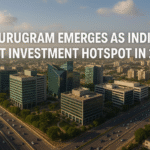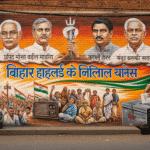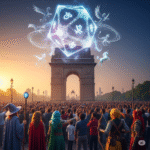Faith at a Crossroads: Bridging Divides or Deepening Fault Lines
In an increasingly interconnected world, religious and cultural beliefs play a dual role in society. They can foster unity and shared purpose but also fuel division and exclusion. In India, a nation celebrated for its spiritual diversity, this dichotomy is sharply evident. From interfaith weddings to communal violence, beliefs are shaping society in ways that often contradict their intended principles of compassion, inclusivity, and harmony.
The Dual Role of Beliefs
Beliefs are integral to identity, offering a sense of belonging and guiding moral principles. Yet, when rigidly interpreted or weaponized, they risk creating barriers that fragment society.
- Building Bridges:
Many religious practices and philosophies emphasize unity. The Langar (community kitchen) at Sikh gurudwaras, open to all regardless of caste or religion, embodies the principle of equality. Similarly, interfaith initiatives like Kerala’s Harmony Festival promote mutual respect among communities. - Erecting Barriers:
Conversely, beliefs often become fault lines. Controversies surrounding interfaith marriages, such as allegations of “love jihad” in parts of India, reveal how religious divides can turn personal choices into political battlegrounds.
Controversial Areas Where Beliefs Divide
- Interfaith Marriages:
- Legal and Social Challenges:
Interfaith couples in India often face hostility from both families and society. The introduction of laws in several states targeting “forced religious conversions” in marriages has added legal scrutiny to personal relationships. Critics, including human rights organizations, argue that these laws fuel mistrust and discourage interfaith unions.- Data on Declining Acceptance:
A Lokniti-CSDS survey (2023) revealed that 62% of respondents opposed interfaith marriages within their families, highlighting the deep-rooted resistance to bridging divides through personal relationships.
- Data on Declining Acceptance:
- Legal and Social Challenges:
- Religious Polarization:
- Communal Violence:
Incidents like the 2020 Northeast Delhi riots, which left over 50 people dead, showcase how religious identities can escalate into violent conflict. A National Crime Records Bureau (NCRB) report noted a 10% increase in communal incidents over the past five years, emphasizing how beliefs, when manipulated, can deepen societal fractures. - Discriminatory Practices:
Access to housing and jobs is often influenced by religious identity, with many Muslims and Dalits reporting systemic discrimination. Studies by organizations like Amnesty International India highlight the exclusionary impact of such barriers.
- Communal Violence:
- Gender Inequality in Religious Spaces:
- Restricted Access:
In many religious traditions, women continue to face exclusion. Debates over women’s entry into temples like Sabarimala or mosques reflect ongoing struggles to reconcile progressive values with traditional practices.- Judicial Interventions:
In 2018, the Supreme Court of India ruled in favor of allowing women of all ages into the Sabarimala temple, sparking nationwide protests and highlighting the deep divide between reformist and orthodox interpretations of faith.
- Judicial Interventions:
- Restricted Access:
- Caste-Based Discrimination:
- Contradiction Within Faith:
Despite the emphasis on equality in texts like the Bhagavad Gita and the Bible, caste-based discrimination remains pervasive. A 2022 National Dalit Movement for Justice report revealed over 35,000 reported cases of caste-based violence in India annually, underscoring the failure to align beliefs with practice.
- Contradiction Within Faith:
Voices of Unity
Amidst these challenges, there are efforts to use belief systems as tools for unity:
- Interfaith Coalitions:
Initiatives like the Interfaith Coalition for Peace bring leaders from different religions together to address common societal issues, such as poverty and education. - Reforms from Within:
Progressive religious leaders are advocating for change. For instance, Imams in Kerala have started promoting gender-inclusive practices in mosques, while Hindu reformists push for caste abolition through reinterpretation of scriptures. - Community-Led Actions:
In Mumbai, a local Hindu temple partnered with a nearby mosque to distribute food during the COVID-19 lockdown, showcasing how shared values can bridge divides.
The Path Forward
To ensure beliefs build bridges rather than barriers, society must embrace critical engagement and inclusivity:
- Education and Awareness:
Schools and colleges should integrate interfaith studies and ethical discussions into curricula to foster understanding and mutual respect. - Legal Safeguards:
Strengthening laws against hate speech and discrimination can help deter the misuse of beliefs to justify exclusion or violence. - Community Dialogue:
Encouraging open discussions at the grassroots level can address mistrust and highlight common values across belief systems.
Conclusion: The Choice Is Ours
Beliefs have the power to unite or divide—how they shape society depends on how they are interpreted and practiced. In India, where faith is deeply intertwined with identity, there is immense potential for beliefs to act as bridges, fostering a sense of shared humanity.
As Mahatma Gandhi once said, “The essence of all religions is one. Only their approaches are different.” It is time to embrace this essence, ensuring that faith becomes a unifying force in an increasingly divided world.



























